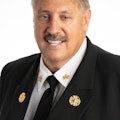As an avid Facebook user, I have more than 1,100 Facebook friends from around the country, mostly people in the fire and EMS community I met through my work, my travels and correspondence. Some are firefighters and paramedics I work with and some are from departments I worked for in the past.
I see their postings and I see the pictures they post. Sometimes, I shake my head. Sometimes, they are my own employees and I have to make a phone call to them to tell them to take down what they posted. What they have posted in the way of their status or the pictures is sometimes questionable. Other times, it definitely crosses the line. Other times, their postings are in good humor and innocuous.
The postings and pictures that make me pick up the phone deal with a patient's status or picture on Facebook. I have even seen pictures of a mobile data terminal (MDT) with the patient's name, address and chief complaint posted on Facebook. Obviously, somebody snapped a picture of the MDT with a camera phone enroute to a call and uploaded it to a Facebook page, thinking it is an unusual call that everyone on Facebook would chuckle over.
Be warned: Employers are taking your postings seriously. I know of one hospital that, ridiculously to me, fired paramedics who were working secondary employment at the hospital because they posted information on Facebook. That posting did not reveal the patient's name or health information, nor did the paramedics identify themselves as being employed by the hospital. But the hospital still fired two of the paramedics and the third one chose to resign. That third paramedic merely said "good morning" while using the first name of someone who the hospital suspected was a patient.
I did some research and I found a firefighter/paramedic in Massachusetts who might lose his job over some postings on Facebook. In those postings, he ridiculed and disparaged members of the department, mocked local residents, posted a picture of a special-needs adult with a firefighter and posted a comment against the homosexual community.
In Florida, three firefighter/paramedics were disciplined for taking an ambulance to a private party while on duty and fraternizing with guests. Pictures obtained from a Facebook page showed drinking and sex acts. An investigation showed that none of the firefighter/paramedics were drinking or engaged in any of the sex acts while at the party. However, they were disciplined because they attended the party while they were on duty.
In South Carolina, a firefighter/paramedic was fired after posting a spoof video on Facebook that was considered to be derogatory. The video showed a doctor from what was inferred to be a local hospital. The firefighter/paramedic was fired for conduct unbecoming. A paramedic in New York was fired after he posted photos on Facebook from a homicide scene of a young woman who had been murdered.
The biggest issue with Facebook is the posting of patient information or pictures. Secondary are comments about departments, superiors and co-workers. Section 230 of the Communications Decency Act absolves all websites from any liability arising from any posting. But this does not absolve you! Factors may include whether you posted the information while you were working, whether you used a department computer or whether you posted the materials while off duty on your personal equipment.
Many fire departments will argue that you represent the department because of your position whether you are on or off duty, or whether you used fire department or personal equipment. Others will argue free speech and First Amendment rights. Some on Facebook change their privacy settings so that only friends can see their posts and images.
Facebook is not the only social networking site. MySpace, Twitter, Flickr, Craigslist, YouTube and a thousand other networking sites are also potential areas where firefighters and paramedics can find themselves in trouble. I'd like to suggest some rules of thumb to follow when using social media: Don't post inappropriate images. Don't complain about your superiors or co-workers in a public format. Don't use social networking while engaged in patient care or other work activities. Be careful about what you post and consider the impact of what you are posting.
See you on Facebook.
GARY LUDWIG, MS, EMT-P, a Firehouse® contributing editor, is a deputy fire chief with the Memphis, TN, Fire Department. He has 33 years of fire-rescue experience. Ludwig is chair of the EMS Section for the International Association of Fire Chiefs (IAFC), was appointed to the National EMS Advisory Council by the U.S. Secretary of Transportation and is a member of the International Association of Fire Fighters (IAFF) EMS Standing Committee. Ludwig has a master's degree in business and management and is a licensed paramedic. He is a frequent speaker at fire and EMS conferences nationally and internationally and can be reached through his website at www.garyludwig.com.
About the Author
Gary Ludwig
GARY LUDWIG has served in three fire departments over his career: St. Louis, Memphis, and Champaign, IL. His fire, EMS and rescue career spanned a total of 46 years, and he has been a paramedic for over 44 years. Ludwig served as president of the International Association of Fire Chiefs in 2019-20. He has a Master’s degree in Business and Management, has written over 500 articles for professional fire and EMS publications and is the author of seven books.
Connect with Gary
Email: [email protected]
Facebook: Gary Ludwig
Twitter: @ChiefGaryLudwig
Website: garyludwig.com
